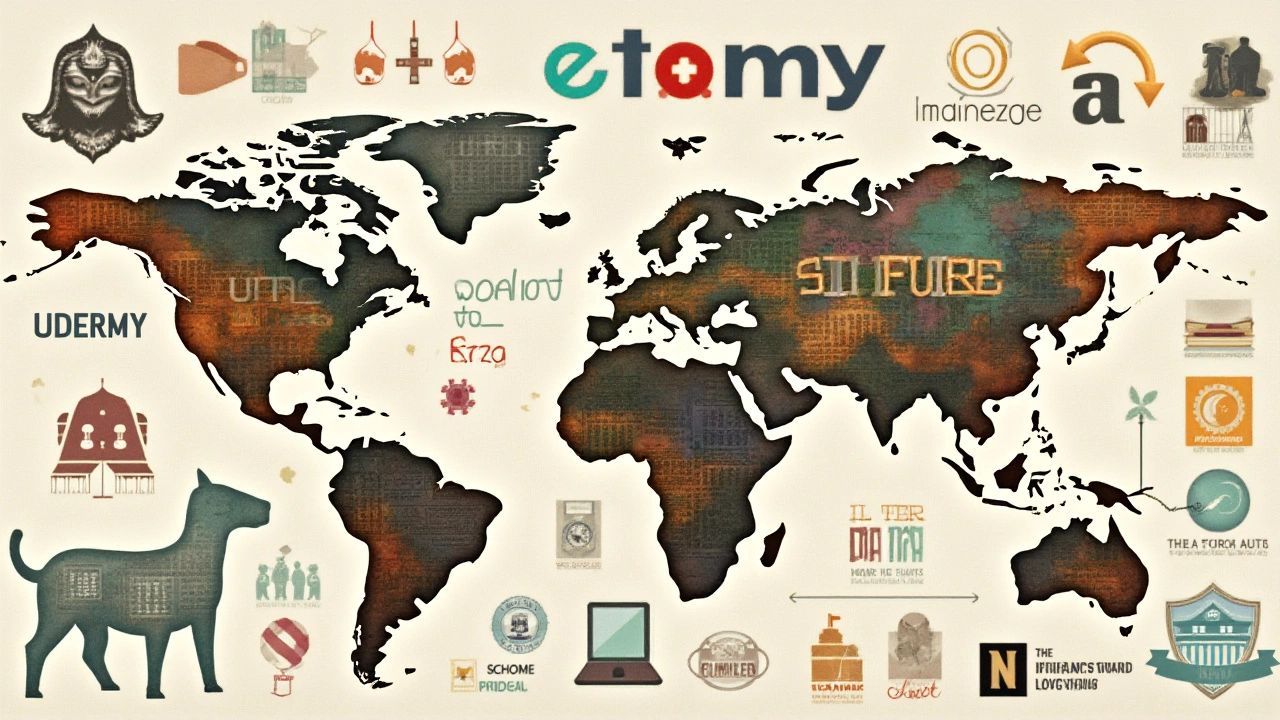
In the ever-evolving world of technology and digital transformation, eLearning platforms have emerged as a cornerstone of modern education. These platforms have opened up a universe of knowledge, making it accessible to people from all walks of life, regardless of geographical boundaries.
Whether you're looking to pick up a new hobby, advance your career, or even earn a degree, there are countless eLearning platforms offering courses tailored to your needs. This growing field includes well-known names like Udemy and LinkedIn Learning, each serving unique user preferences and learning styles.
Through this article, we will delve into some of the most popular eLearning platforms, explore niche options that cater to specialized interests, and look at open-source solutions that offer educational freedom. We'll also provide tips on choosing the platform that suits your educational or professional journey, ensuring your online learning experience is both enriching and effective.
- Popular eLearning Platforms
- Niche and Specialized Platforms
- Open Source Options
- Choosing the Right Platform
Popular eLearning Platforms
In the realm of digital learning, several eLearning platforms have stood out due to their extensive offerings and exceptional user experiences. Among these platforms, some have gained popularity for their versatility and depth of content. Let's delve into a few of these leading platforms that are shaping the landscape of online education. Their contributions have made them household names among learners and educators alike, providing robust tools to enhance knowledge and skills across various domains.
Udemy
Udemy is one of the frontrunners in the online education space, offering a diverse catalog of courses. This platform caters to learners around the globe, featuring millions of courses that range from programming and business to photography and music. What makes Udemy particularly appealing is its flexibility; learners can go at their own pace, choosing from a broad selection of content that suits their schedule and learning style. The platform supports multiple languages and is frequently updated to ensure users have access to the latest knowledge. One critical aspect of its success is the open marketplace model that allows individual instructors to create and sell courses, thus expanding the variety available to users.
Coursera
Founded by professors from Stanford University, Coursera stands out as a collaboration between academic institutions and companies to offer courses for professional development. Its courses, known as MOOCs (Massive Open Online Courses), often contain assignments, peer reviews, and exams to gauge understanding. Coursera provides opportunities to earn certificates or even degree credentials in fields like computer science, data science, and business administration. Many courses are taught by respected university faculty, making it a platform of choice for those pursuing academic credence through flexible means. Coursera's partnerships with leading universities and organizations ensure that the quality of education mirrors that of a traditional setting.
LinkedIn Learning
LinkedIn Learning, previously known as Lynda.com, integrates seamlessly with the LinkedIn network to provide courses that hone professional skills. Users can tailor their learning experiences based on their career goals or industry trends, making it particularly beneficial for professionals looking to enhance employability. Courses often focus on tech and business skills, but creative courses are available too. LinkedIn Learning uses a subscription model, providing learners with unlimited access to thousands of courses for less than the cost of a traditional college credit. With its connection to LinkedIn, users can add completed courses directly to their profiles, showcasing their skills to potential employers.
Course Offerings and User Base
Here is a table highlighting the course offerings and user base for these popular platforms:
| Platform | Number of Courses | User Base |
|---|---|---|
| Udemy | Over 183,000 | 40+ million users |
| Coursera | Over 5,000 | 77+ million users |
| LinkedIn Learning | Over 16,000 | 27+ million users |
These platforms have democratized education, offering high-quality learning experiences that are affordable and accessible to anyone with an internet connection. They embody the shift from traditional educational models to a more open, flexible approach, wherein learners can control their educational journey. As technology and education trends evolve, these eLearning platforms are expected to continue adapting and growing, offering an even wider array of opportunities for personal and professional growth.

Niche and Specialized Platforms
Niche and specialized eLearning platforms have carved out a space in the digital learning landscape by focusing on targeted fields of knowledge. These platforms are particularly valuable for individuals seeking mastery in specific areas or industries. The breadth of courses available ranges from the arts and humanities to specialized tech skills, each designed to cater to learners with distinct interests or professional needs. These platforms often boast instructors who are experts in their fields, offering insider insights that are rarely found in more general courses. This specificity can lead to deeper understanding and more practical applications in real-world scenarios.
Among these niche platforms, MasterClass stands out by offering content taught by celebrities and top professionals. Here, users can learn filmmaking from Martin Scorsese, cooking from Gordon Ramsay, or tennis from Serena Williams. Each course on MasterClass is crafted with high production values, making the learning experience engaging and visually appealing. By focusing on specialists, learners gain access to tips and techniques that have been honed by years of expertise.
"If you are not willing to risk the unusual, you will have to settle for the ordinary." - Jim Rohn
For those interested in technology and software development, Pluralsight offers an extensive library focused on IT and programming courses. It's a haven for tech enthusiasts and professionals looking to upskill or dive into new programming languages or technical certifications. The platform regularly updates its content, ensuring learners stay abreast of the latest industry trends and advancements. Another great example is Craftsy, a platform dedicated to arts and crafts. It provides a variety of hands-on courses in sewing, knitting, and painting, allowing hobbyists to refine their skills and spark creativity.
Then there is Highbrow, a unique platform that delivers micro-courses straight to your inbox. These brief, daily lessons are perfect for busy individuals who want to learn something new each day without a large time commitment. Highbrow covers a wide range of topics, from business management to philosophy, making it an excellent choice for curious minds seeking a quick and efficient learning experience. Online education has truly broadened horizons by providing opportunities that are just as diverse as the learners themselves.
The value of niche digital learning lies in its ability to offer focused education that aligns closely with learners' passions and career objectives. Whether you're looking to indulge in a hobby, hone your craft, or advance in your profession, these specialized platforms cater to your needs. By tapping into these resources, you open the door to not only acquiring new skills but also connecting with like-minded enthusiasts and professionals who share your interests.

Open Source Options
Open-source eLearning platforms represent a fascinating blend of community effort, collaborative spirit, and technical prowess. These platforms offer a wealth of opportunities for learners and educators to create customized educational experiences without the constraints of traditional commercial options. When we talk about open-source eLearning solutions, we're delving into a world where innovation meets accessibility, and where knowledge can be both shaped and shared by a community. This section explores some of the key players in the open-source eLearning landscape.
At the forefront of open-source eLearning platforms is Moodle. Known for its flexibility and scalability, Moodle is utilized by countless educational institutions, including some of the world's top universities. Its robust suite of features includes course management, collaboration tools, and multimedia integration options. The platform's open nature allows educators to tailor courses to specific needs, whether for academic curricula or corporate training modules. This adaptability ensures that Moodle remains a vital resource in the eLearning toolkit.
Another noteworthy open-source platform is Sakai, which brings together a host of innovative tools aimed at enhancing the learning experience. From discussion boards to wikis, and from assignment management to a comprehensive gradebook, Sakai provides an all-in-one solution for online education. What makes Sakai particularly appealing is its community-driven development approach, which continuously fuels improvements and new features based on user feedback. This collaborative ethos not only benefits users by providing a product that evolves over time but also fosters a sense of ownership and involvement.
While these platforms offer significant advantages, they also come with challenges that require careful consideration. For instance, implementing and maintaining an open-source system can demand a certain level of technical expertise, as well as a commitment to regular updates and security scrutiny. Nevertheless, with communities dedicated to supporting each platform, such hurdles are often seen as opportunities to learn and grow.
It's intriguing to note how open-source platforms align with global educational and technological trends. With the ongoing shift towards online education, these platforms empower institutions to deliver personalized and culturally relevant content without the financial burden of licensing fees. A Harvard Business Review article once noted, "Open source has the potential to democratize education, creating avenues for learning that are shaped by those who participate." This democratization of education is pivotal in broadening access to knowledge, reaching learners in remote or underserved areas.
The choice of an open-source eLearning platform often depends on specific organizational needs. When selecting a platform, consider aspects such as user interface design, community support, and integration capabilities with existing systems. Additionally, evaluating compatibility with mobile learning trends and analytics tools can significantly enhance the experience for both administrators and learners.
Open-source eLearning platforms are undoubtedly a key piece of the modern educational puzzle. They bring the possibility of crafting a unique, collaborative learning environment that resonates with the spirit of global connectivity and innovation. Whether you're an educator seeking to enhance your courses or a developer looking to contribute to an inspiring project, delving into open-source solutions offers a rewarding pathway to personal and professional growth.

Choosing the Right Platform
Embarking on your digital learning journey requires careful thought about which eLearning platform best suits your needs and aspirations. The decision hinges on several factors such as the type of content, the learning style that resonates with you, and financial considerations. Popular platforms like Coursera and edX offer courses from prestigious universities, often with the option to earn verified certificates or even degrees. But if a more relaxed approach is desired, Udemy and LinkedIn Learning might be ideal, as they allow learners to explore content at their own pace across a wide array of subjects devoid of academic pressure.
The way you prefer to learn is crucial in this selection process. Some people thrive in an instructor-led environment, with structured coursework and deadlines, while others favor the freedom of self-paced study. Platforms like FutureLearn deliver a social learning atmosphere where discussion and collaboration are encouraged, adding a rich layer to the education process. On the flip side, platforms such as Skillshare allow users to dip in and out of lessons, focusing more on practical skills through hands-on projects. Understanding your personal learning preferences can significantly enhance the efficiency and enjoyment of the online learning experience.
"The beautiful thing about learning is nobody can take it away from you." - B.B. King
Budget also plays an integral role in platform selection. Some platforms provide exceptional content free of charge. For example, Khan Academy offers educational lessons tailored to school-aged children at no cost. Conversely, sites like MasterClass offer a premium experience, showcasing lessons from high-profile experts in specialized fields for a subscription fee. It's important to evaluate the return on investment with any fee-based program, balancing cost with the quality and breadth of content available.
In today's data-driven world, numeric facts can often guide decisions. According to statistics, 90% of companies offer their employees eLearning opportunities, and these employees often experience a 25% productivity boost post-training. If professional development tops your list, platforms such as Coursera and LinkedIn Learning cater extensively to corporate training needs, offering pathways to significant upskilling. Many platforms allow trial periods or sample lessons, which can be an excellent way to gauge if a platform's teaching style, content range, and user interface align with your expectations before committing financially.
The sheer variety and reach of digital online education platforms underscore the importance of researching and evaluating options carefully. Once you've weighed the key aspects like course selection, learning format, and cost, it's invaluable to read user reviews and even connect with peers who might have hands-on experience with these platforms. Community perspectives often highlight nuances that educational brochures do not, giving you a clearer picture of the potential learning journey ahead. A well-informed choice can lead to a rewarding learning experience, delivering knowledge and skills that are pertinent, practical, and profoundly transformative.





